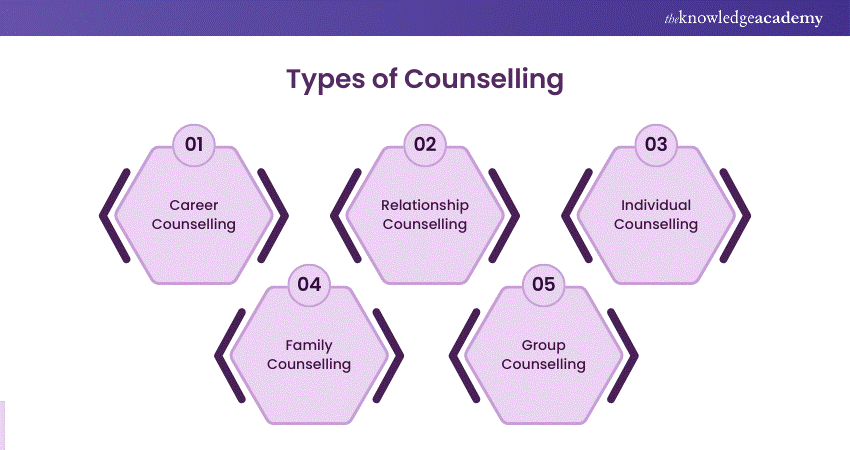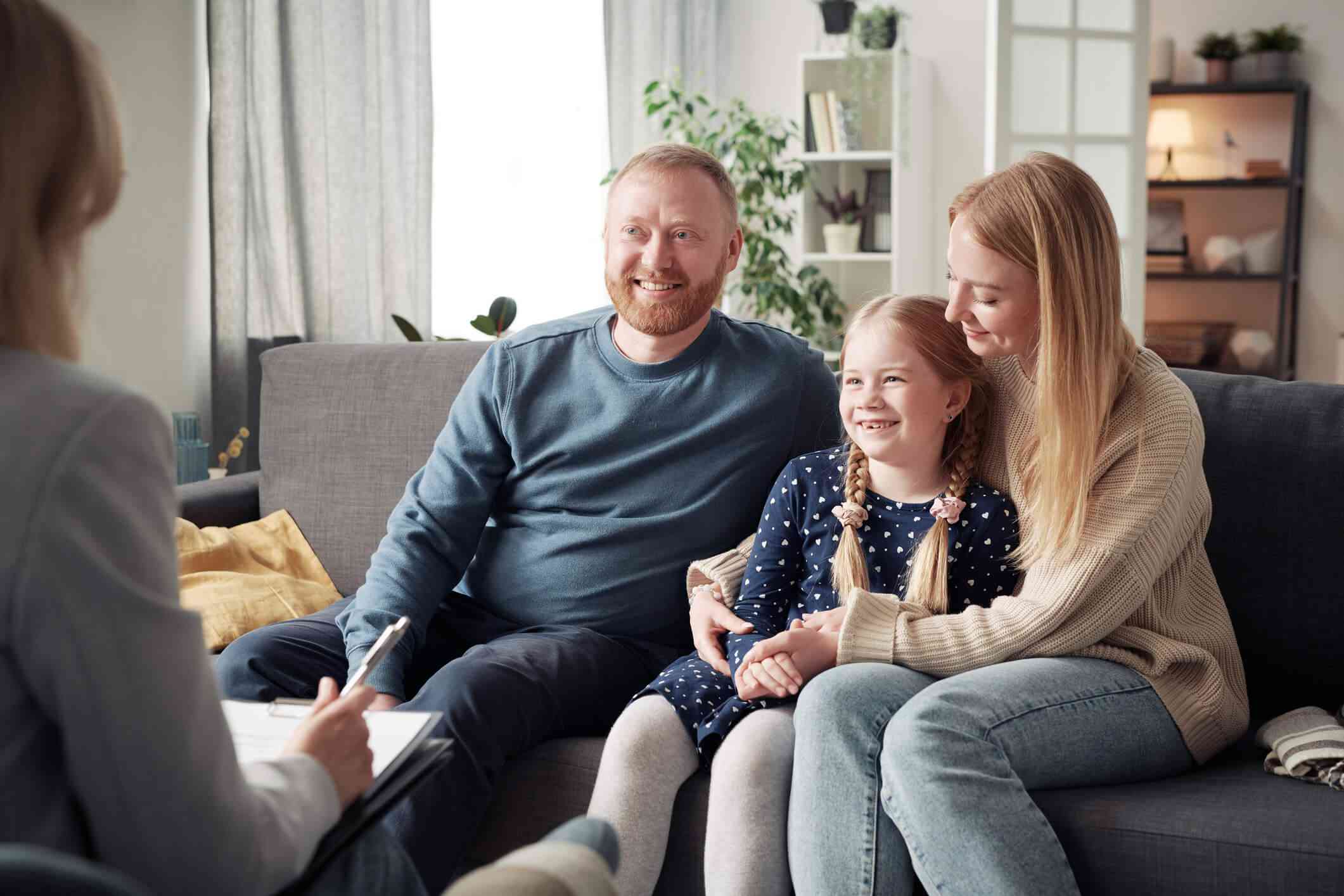Discover Everything About the Different Kinds of Therapy Available Today
The landscape of counselling today provides a varied range of options customized to fulfill varying psychological wellness demands. From specific sessions addressing individual battles to team setups that cultivate shared experiences, each type serves a distinctive function (couples counselling). Pairs and family therapies focus on relationship dynamics, while imaginative methods like art treatment urge expression. Recognizing these different strategies can disclose beneficial devices for steering life's obstacles. What may be the ideal suitable for you or someone you recognize?
Private Counselling

The procedure generally involves establishing personal objectives and establishing coping techniques tailored to the person's scenarios. Methods may consist of cognitive-behavioral therapy, psychodynamic treatment, or mindfulness methods, depending upon the customer's choices and demands.
Individual therapy encourages customers to get insights right into their emotions and establish skills to manage life's challenges effectively. This one-on-one communication promotes self-discovery, ultimately leading to individual growth and improved mental wellness. low cost therapy. For several, it comes to be a crucial source in navigating the complexities of life and discovering a course to psychological resilience
Couples Counselling
Couples counselling uses a structured environment for partners to resolve relationship obstacles and improve communication. It frequently concentrates on concerns such as conflict resolution, intimacy, and trust. Participants can anticipate directed discussions that promote understanding and foster much healthier communications.

Benefits of Couples Counselling
While relationships usually encounter difficulties that can appear impossible, couples counselling uses a path to understanding and resolution. This form of treatment supplies couples with a risk-free space to discover their feelings and communicate a lot more efficiently. Via directed sessions, companions can determine patterns of habits, boost conflict resolution abilities, and foster much deeper psychological connections. Couples counselling can also enhance shared regard and understanding, permitting individuals to share their needs and problems freely. By functioning with a trained specialist, pairs can get useful insights right into their partnership characteristics. Inevitably, the benefits of pairs counselling expand past prompt concerns, promoting much healthier, a lot more resistant partnerships that can adjust to future obstacles.
Typical Concerns Resolved
Several connections come across a range of typical issues that can be efficiently dealt with via pairs counselling. Communication troubles typically occur, leading to misconceptions and conflicts. Pairs may have problem with psychological disconnection, which can create sensations of seclusion and bitterness. Count on problems often surface, especially after infidelity or deceit, impacting the structure of the connection. Furthermore, differences in values or life objectives can create significant stress. Economic tension can also strain partnerships, as disagreements regarding costs and conserving can cause conflict. Additionally, managing parenting obligations can create friction for couples managing child-rearing obstacles. By addressing these concerns in an encouraging setting, pairs counselling assists partners gain understandings, develop healthier communication techniques, and job in the direction of settling their distinctions.
What to Expect
Participating in pairs counselling can be a transformative experience for partners seeking to resolve their connection difficulties. Throughout sessions, pairs can expect a safe atmosphere where they can freely connect their sensations and problems. A skilled therapist will certainly guide discussions, assisting partners to recognize patterns, enhance interaction abilities, and establish much healthier dispute resolution strategies.
Pairs generally join both private and joint sessions, enabling for diverse perspectives on the problems at hand. The specialist may assign exercises or homework to strengthen skills learned throughout sessions. As pairs progress, they might experience boosted empathy and understanding in the direction of each various other, inevitably working in the direction of reconstructing trust fund and intimacy. In general, couples counselling purposes to promote a stronger, extra resilient partnership.
Family Therapy
Family members therapy works as an essential resource for resolving social characteristics within households. This healing method focuses on improving interaction and fixing conflicts among family participants. By taking part in family therapy, people can learn to recognize one an additional's viewpoints, fostering empathy and cooperation.
Specialists usually use numerous methods to assist in discussions, reveal underlying concerns, and promote healthier connections. Sessions might involve all household members or concentrate on details internet individuals, depending on the demands of the family. The specialist's duty is to provide a risk-free environment where each participant can reveal their ideas and sensations without judgment.
Family members therapy can be advantageous for a variety of concerns, consisting of divorce, despair, parenting challenges, and mental wellness issues. Ultimately, this kind of therapy intends to reinforce familial bonds, improve psychological support, and equip family members with devices to navigate problems, adding to general household well-being.
Group Coaching
Individuals may feel separated in their struggles, team counselling supplies an encouraging environment where they can attach with others encountering similar obstacles. This kind of counselling commonly involves little teams led by a trained facilitator, permitting individuals to share experiences and understandings in a secure room.
Team therapy fosters a sense of community and belonging, which can be particularly useful for those managing issues such as addiction, anxiety, or pain. Individuals typically find convenience in recognizing that they are not the only one in their sensations, causing raised empathy and understanding.
The interaction within the team can likewise promote personal growth, as individuals obtain responses and support from peers who might use different perspectives. Inevitably, team therapy works as an effective tool for healing, promoting both specific and collective development as members collaborate in the direction of usual goals.
Art and Play Treatment
Art and play therapy provides an innovative electrical outlet for individuals, especially kids, to reveal feelings and experiences that may be hard to express verbally. This restorative approach makes use of artistic activities and play to foster interaction, enabling people to discover their feelings in a risk-free and encouraging setting. Through drawing, paint, or taking part in play situations, customers can convey their innermost ideas and feelings without the restrictions of language.
Therapists trained in this method observe the communications and developments of their clients to gain understandings into their psychological states and emotional obstacles. couples counselling. The non-threatening nature of art and play can be particularly useful for youngsters who might battle with conventional talk therapy. In addition, it promotes self-esteem and analytical skills, motivating individual growth. Generally, art and play therapy functions as an efficient ways of healing, helping with psychological expression and understanding for people of every ages
Cognitive Behavior Therapy (CBT)
Cognitive Behavior Modification (CBT) is based in the core principle that ideas, feelings, and behaviors are interconnected. This healing technique uses different strategies and approaches to challenge unfavorable idea patterns and advertise healthier reactions. The benefits of CBT are well-documented, making it a prominent selection for individuals seeking reliable psychological wellness treatment.

Core Concepts of CBT
How do thoughts influence feelings and actions? Cognitive Behavior Therapy (CBT) operates the facility that cognitive processes form an individual's sensations and actions. This healing strategy emphasizes the interconnectedness of ideas, feelings, and behaviors, suggesting that maladaptive idea patterns can bring about negative psychological states and purposeless habits. One core principle of CBT is the identification and adjustment of these distorted ideas, making it possible for people to create healthier cognitive structures. Furthermore, CBT advertises the idea of individual obligation, urging clients to take an energetic role in their recovery procedure. With organized sessions, customers discover to challenge unreasonable ideas, inevitably fostering resilience and enhanced emotional policy. This focus on cognitive restructuring distinguishes CBT from other therapeutic techniques.
Techniques and Strategies
Although different strategies and methods exist within Cognitive Behavior Treatment (CBT), they all objective to facilitate positive change by addressing maladaptive thought patterns. One noticeable technique her comment is here is cognitive restructuring, which involves recognizing and testing unfavorable ideas. Clients discover to replace these ideas with even more well balanced, practical ideas. Behavioral activation is another strategy, urging people to participate in tasks that boost state of mind and decrease evasion. Direct exposure treatment, typically used for stress and anxiety conditions, slowly reveals customers to feared situations, helping to diminish their anxiousness responses. Additionally, mindfulness methods may be incorporated, advertising present-moment recognition and reducing rumination. Collectively, these techniques equip individuals to develop healthier coping systems and improve emotional regulation, laying the foundation for long lasting adjustment.
Advantages of CBT Treatment
CBT treatment provides countless benefits that add to its popularity as a restorative technique. One significant advantage is its organized format, which allows customers to establish specific objectives and measure progression successfully. This goal-oriented nature improves motivation and responsibility. In addition, CBT furnishes individuals with practical skills and approaches to handle negative ideas and actions, promoting long-lasting self-help. Research indicates its effectiveness in treating various conditions, including anxiousness, depression, and stress-related conditions. In addition, CBT sessions are commonly shorter in duration contrasted to other treatments, making it more easily accessible for those with time constraints. Overall, the mix of its evidence-based techniques and focus on equipping clients makes CBT an engaging choice for several seeking mental wellness assistance.
Frequently Asked Concerns
How Do I Choose the Right Kind Of Therapy for Me?
Picking the appropriate type of therapy includes reviewing individual needs, preferences, and goals. Researching different techniques, getting in touch with professionals, and thinking about individual comfort levels are necessary action in making an informed choice for efficient support.
What Credentials Should a Counselor Have?
When thinking about certifications for a counselor, one need to look for a pertinent level, professional certification, and licensure. Additionally, directory experience in specific restorative strategies and continuous professional growth are necessary for efficient therapy method.
For how long Does Each Counselling Session Normally Last?
Usually, each counseling session lasts in between 45 to 60 minutes. Nonetheless, durations can differ relying on the counselor's approach, client needs, and specific therapeutic objectives, making certain both adaptability and effectiveness in the counseling process.
Is Therapy Covered by Medical Insurance Program?
Counselling protection varies by medical insurance strategies. Some strategies consist of mental health services, while others may have limitations or need particular providers. It is essential for individuals to check their policy information for precise details.
Can Therapy Be Done Online or Basically?
Counselling can certainly be carried out online or virtually, allowing individuals to access treatment from the comfort of their homes. This approach has actually acquired appeal, offering flexibility and ease for both clients and specialists in the area.